
翻译C 一汉译英
翻译C ——汉译英
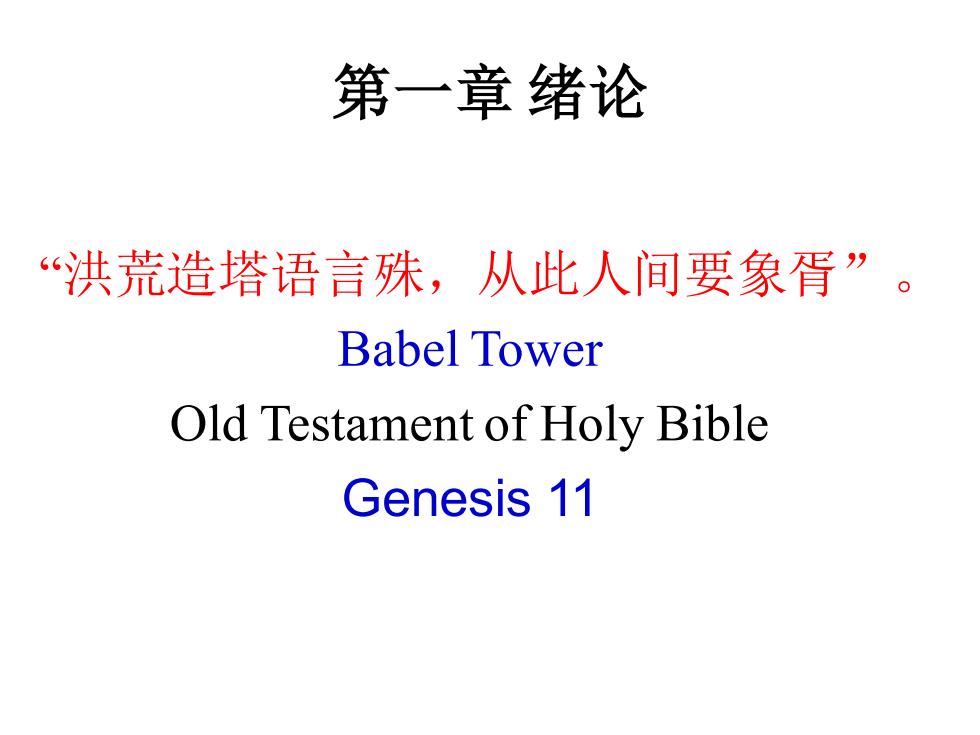
第一章绪论 洪荒造塔语言殊,从此人间要象胥”。 Babel Tower Old Testament of Holy Bible Genesis 11
第一章 绪论 “洪荒造塔语言殊,从此人间要象胥”。 Babel Tower Old Testament of Holy Bible Genesis 11
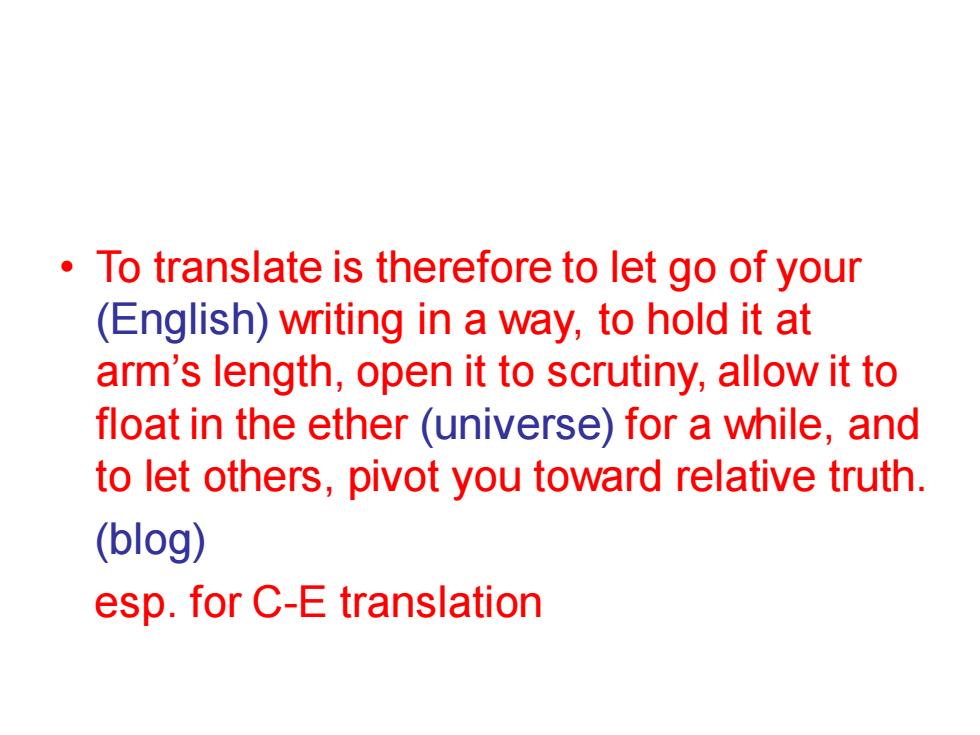
To translate is therefore to let go of your (English)writing in a way,to hold it at arm's length,open it to scrutiny,allow it to float in the ether(universe)for a while,and to let others,pivot you toward relative truth. (blog) esp.for C-E translation
• To translate is therefore to let go of your (English) writing in a way, to hold it at arm’s length, open it to scrutiny, allow it to float in the ether (universe) for a while, and to let others, pivot you toward relative truth. (blog) esp. for C-E translation
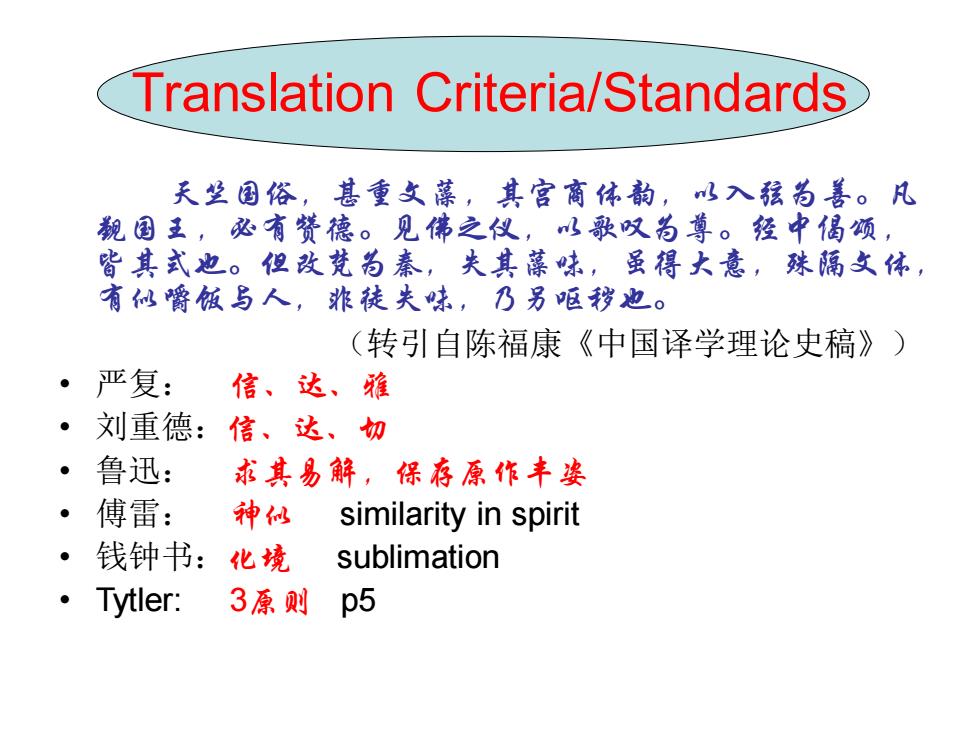
Translation Criteria/Standards 天丝国俗,甚重文藻,其宫商体韵,以入弦为善。凡 觐国王,必有赞德。见佛之仪,以歌叹为尊。经中偈项, 皆其式也。但改梵为秦,失其藻味,虽得大意,殊隔文体, 有似嚼饭与人,非徒失味,乃另呕秽也。 (转引自陈福康《中国译学理论史稿》) 严复: 信、达、雅 ·刘重德:信、达、切 ·鲁迅: 求其易解,保存原作丰姿 ·傅雷:神似 similarity in spirit 钱钟书:化境sublimation Tytler: 3原则p5
Translation Criteria/Standards 天竺国俗,甚重文藻,其宫商体韵,以入弦为善。凡 觐国王,必有赞德。见佛之仪,以歌叹为尊。经中偈颂, 皆其式也。但改梵为秦,失其藻味,虽得大意,殊隔文体, 有似嚼饭与人,非徒失味,乃另呕秽也。 (转引自陈福康《中国译学理论史稿》) • 严复: 信、达、雅 • 刘重德:信、达、切 • 鲁迅: 求其易解,保存原作丰姿 • 傅雷: 神似 similarity in spirit • 钱钟书:化境 sublimation • Tytler: 3原则 p5
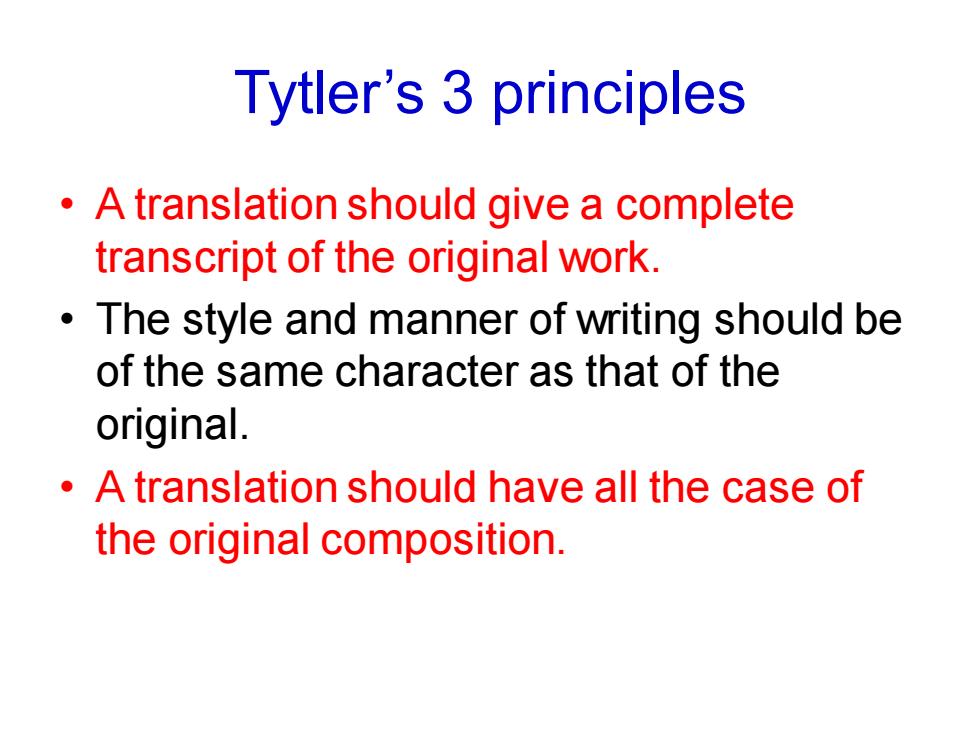
Tytler's 3 principles A translation should give a complete transcript of the original work. The style and manner of writing should be of the same character as that of the original. A translation should have all the case of the original composition
Tytler’s 3 principles • A translation should give a complete transcript of the original work. • The style and manner of writing should be of the same character as that of the original. • A translation should have all the case of the original composition
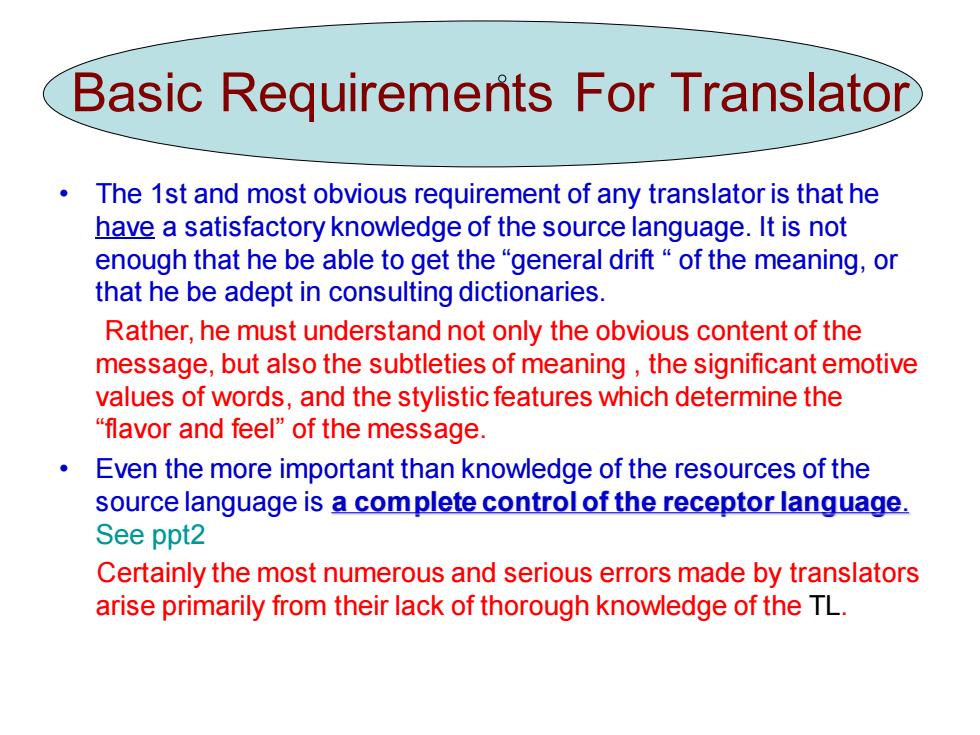
Basic Requiremenits For Translator The 1st and most obvious requirement of any translator is that he have a satisfactory knowledge of the source language.It is not enough that he be able to get the"general drift"of the meaning,or that he be adept in consulting dictionaries. Rather,he must understand not only the obvious content of the message,but also the subtleties of meaning,the significant emotive values of words,and the stylistic features which determine the "flavor and feel"of the message. Even the more important than knowledge of the resources of the source language is a complete control of the receptor language. See ppt2 Certainly the most numerous and serious errors made by translators arise primarily from their lack of thorough knowledge of the TL
Basic Requirements For Translator • The 1st and most obvious requirement of any translator is that he have a satisfactory knowledge of the source language. It is not enough that he be able to get the “general drift “ of the meaning, or that he be adept in consulting dictionaries. Rather, he must understand not only the obvious content of the message, but also the subtleties of meaning , the significant emotive values of words, and the stylistic features which determine the “flavor and feel” of the message. • Even the more important than knowledge of the resources of the source language is a complete control of the receptor language. See ppt2 Certainly the most numerous and serious errors made by translators arise primarily from their lack of thorough knowledge of the TL
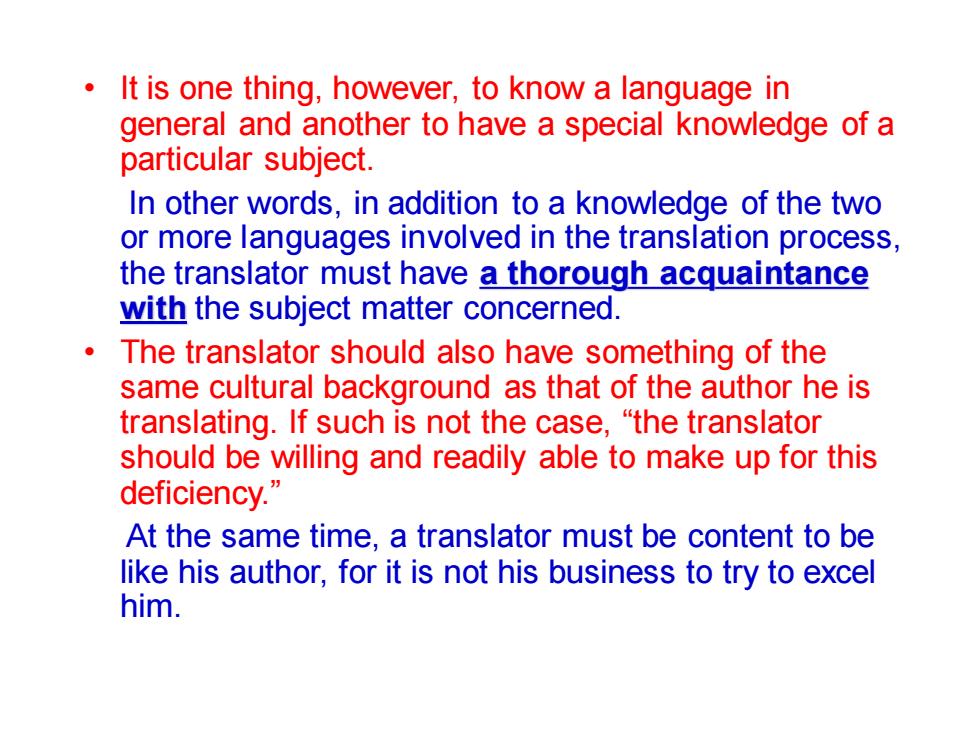
It is one thing,however,to know a language in general and another to have a special knowledge of a particular subject. In other words,in addition to a knowledge of the two or more languages involved in the translation process, the translator must have a thorough acquaintance with the subject matter concerned. The translator should also have something of the same cultural background as that of the author he is translating.If such is not the case,"the translator should be willing and readily able to make up for this deficiency. At the same time,a translator must be content to be like his author,for it is not his business to try to excel him
• It is one thing, however, to know a language in general and another to have a special knowledge of a particular subject. In other words, in addition to a knowledge of the two or more languages involved in the translation process, the translator must have a thorough acquaintance with the subject matter concerned. • The translator should also have something of the same cultural background as that of the author he is translating. If such is not the case, “the translator should be willing and readily able to make up for this deficiency.” At the same time, a translator must be content to be like his author, for it is not his business to try to excel him
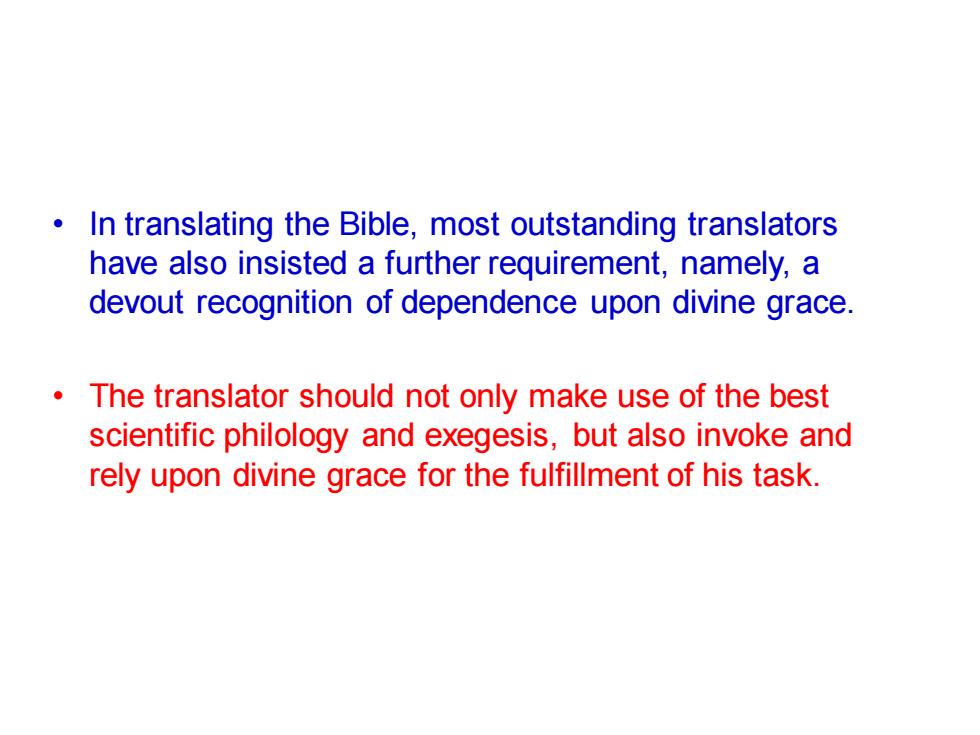
In translating the Bible,most outstanding translators have also insisted a further requirement,namely,a devout recognition of dependence upon divine grace. The translator should not only make use of the best scientific philology and exegesis,but also invoke and rely upon divine grace for the fulfillment of his task
• In translating the Bible, most outstanding translators have also insisted a further requirement, namely, a devout recognition of dependence upon divine grace. • The translator should not only make use of the best scientific philology and exegesis, but also invoke and rely upon divine grace for the fulfillment of his task
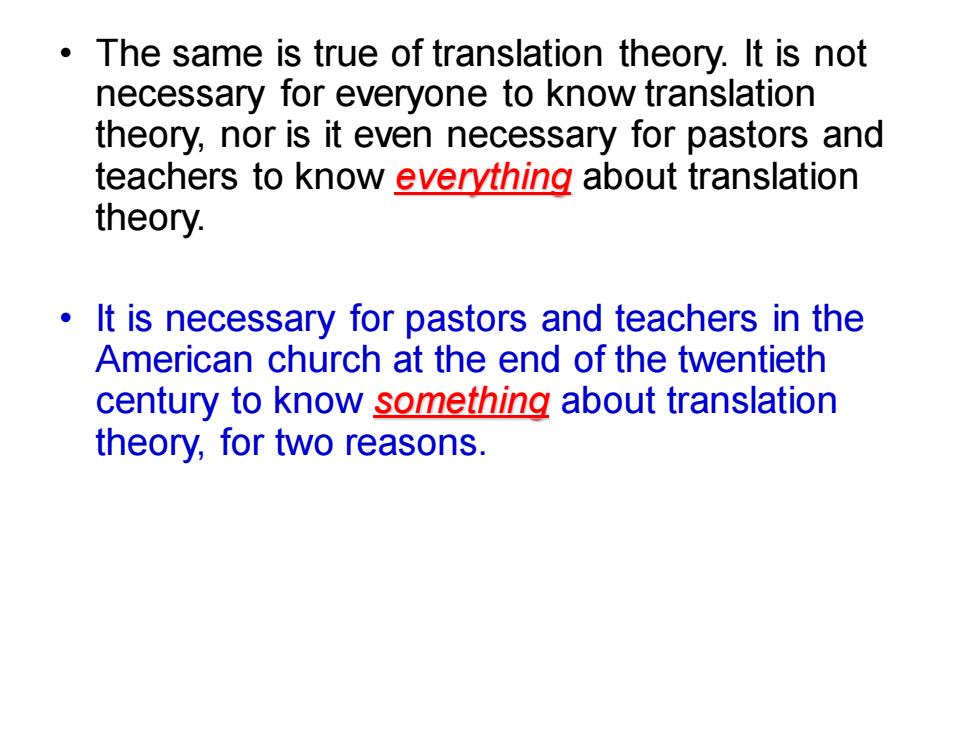
The same is true of translation theory.It is not necessary for everyone to know translation theory,nor is it even necessary for pastors and teachers to know everything about translation theory. It is necessary for pastors and teachers in the American church at the end of the twentieth century to know something about translation theory,for two reasons
• The same is true of translation theory. It is not necessary for everyone to know translation theory, nor is it even necessary for pastors and teachers to know everything about translation theory. • It is necessary for pastors and teachers in the American church at the end of the twentieth century to know something about translation theory, for two reasons
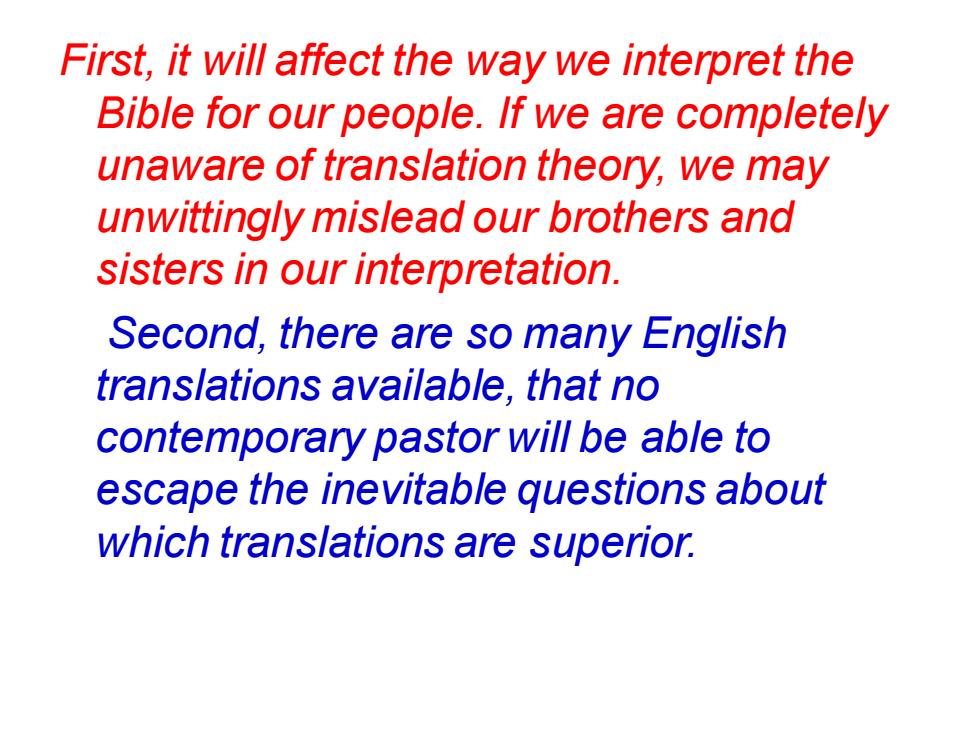
First,it will affect the way we interpret the Bible for our people.If we are completely unaware of translation theory,we may unwittingly mislead our brothers and sisters in our interpretation. Second,there are so many English translations available,that no contemporary pastor will be able to escape the inevitable questions about which translations are superior
First, it will affect the way we interpret the Bible for our people. If we are completely unaware of translation theory, we may unwittingly mislead our brothers and sisters in our interpretation. Second, there are so many English translations available, that no contemporary pastor will be able to escape the inevitable questions about which translations are superior